From Crisis to Care: A Journey of Youth Homelessness
What happens when a young person enters our doors? We welcome them with open arms and meet their immediate needs—a hot meal, emergency medical care, and a safe place to sleep. But we're much more than a shelter. Our programs provide the stability and support that young people need to transform their lives and put themselves on a path to independence.

Moment of Crisis
Every Day, Thousands of Young People Find Themselves Without a Home
As many as 4.2 million young people in the U.S. will experience a period of homelessness each year. The vast majority of youth do not become homeless by choice. There is no one reason why youth experience homelessness. The causes are complex, and their stories vary from person to person.
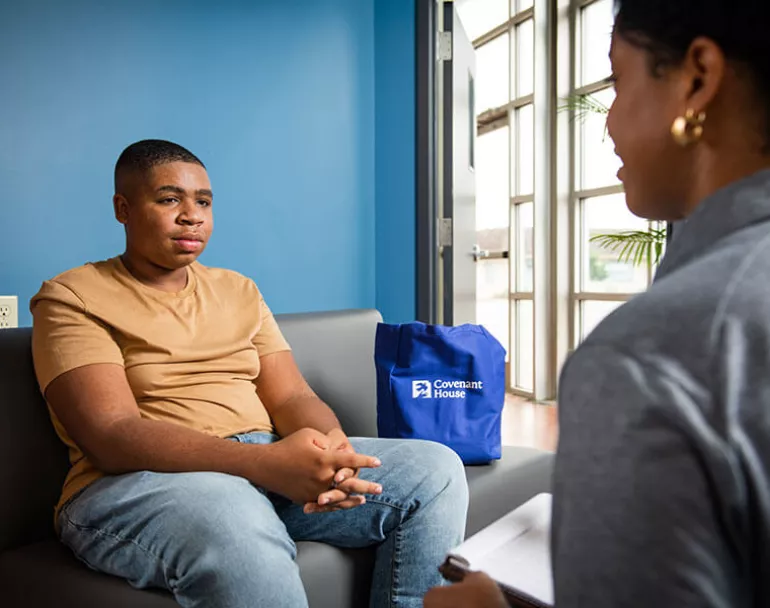


"I was really struggling. I was bouncing back and forth between temporary shelters and sleeping in bushes."
Outreach
We Meet Youth Where They Are
Our community and street outreach teams are often the critical first step in connecting young people experiencing homelessness with assistance. Armed with food, water, hygiene kits, cleaning clothing, blankets, and information about our services they engage with young people with the very same unconditional love and absolute respect that we show our residents.
Learn more about our outreach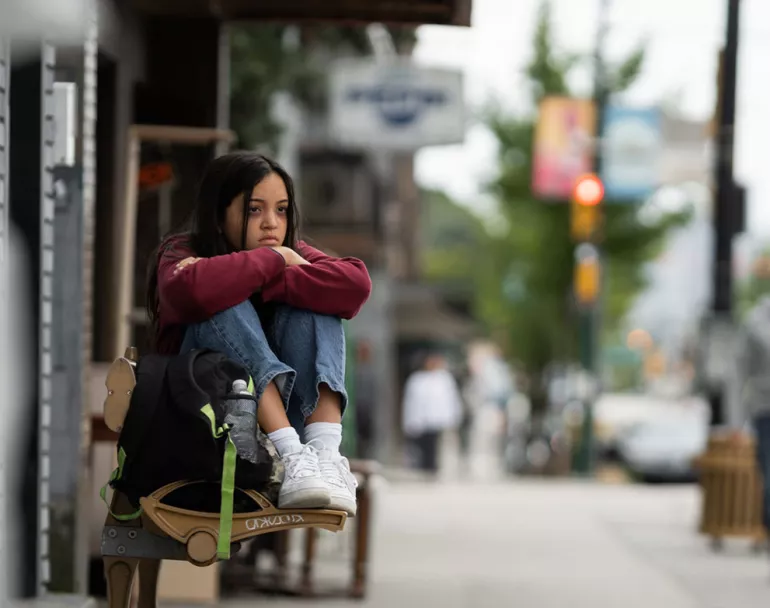

Public Education
We use a variety of platforms to inform and educate the public, government officials, and young people about youth homelessness and human trafficking. We employ a variety offline and online channels and communications to raise awareness of the causes and impacts of youth homelessness and of the signs that a young person might be experiencing homelessness or human trafficking.

Collaboration
Our outreach teams work with partner organizations to try to change laws, policies, and practices that are unjustly leading to so many young people, particularly young people of color, being unhoused and on the streets. We also collaborate with city and statewide coalitions addressing and preventing human trafficking in our communities.
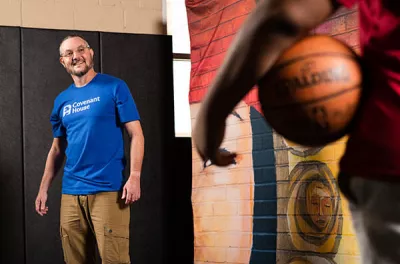
Prevention
Our outreach teams visit neighborhoods where youth are at risk of becoming homeless and educate and inform them of services that are available. Our teams attend committee meetings, sit on town councils, and visit local schools, hospitals, houses of worship, and community group events to inform and teach on the issues of youth homelessness.
Crisis Care
Covenant Home Has an Open Intake Policy
We welcome all youth without judgment or conditions, meeting their immediate basic needs of food, clothing, medical attention, and a safe place to sleep, at no cost. No matter how they find us, where they come from, or their length of stay, we make addressing their needs our top priority.
Learn About Crisis Care
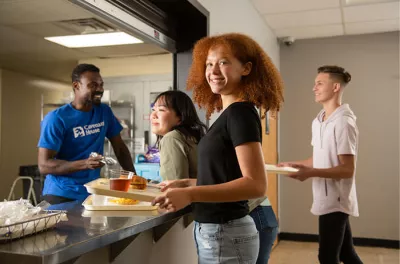
Food
Our youth can count on three nutritious meals and a snack each day. These meals are more than hearty food—they serve as the foundation for building trust with youth who may have experienced abuse or abandonment, or who may have gone hungry in homes struggling to put food on the table, or when they were facing homelessness on the streets.

Shelter
We offer them a welcoming and safe environment based on absolute respect, unconditional love, and relentless support. We make sure that when young people settle into their residential floor, they are welcomed by staff to help get them situated and comfortable. Residents have access to private spaces for time alone and communal spaces designed to encourage healthy relationships.
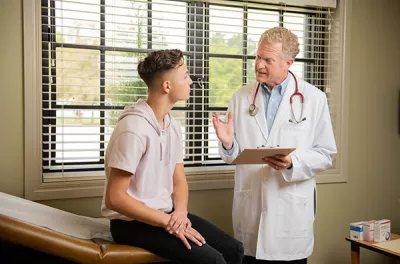
Medical Care
Our trauma-informed health and well-being services range from medical care at our on-site health centers at certain sites, to yoga classes, art and music therapy, counseling, religious and spiritual services, and physical fitness. In these activities, young people heal from the harm done to them while living unhoused and take control of their lives, build on their strengths, and nourish their self-confidence.

"The day I walked into the Covenant Home crisis shelter in Philadelphia. I’ll never forgot how scared I was and how the staff made me feel so welcomed right away."
Long-Term Support
Sustainable Independence
Our staff support each young person on their journey toward sustainable independence and a hope-filled future. Our high-quality programs and services help youth consider their longer-term goals for education, employment, and career planning. We are expertly equipped to respond to the unique needs of young survivors of human trafficking, those who identify as LGBTQ+, and those who are pregnant or parenting.
Explore Long Term Support Services


"Covenant Home was there for me. They didn't know me, but they treated me like family."

Education
Advancing educationally and preparing for the world of work are key to a young person’s prospects for leaving homelessness behind. Either directly or through referral, we guide youth to appropriate educational and vocational opportunities, matching each young person’s strengths and abilities with their interests.

Job Readiness
Our workforce development programs help our young people hone the skills they need to join the workforce, become independent, and sustainably exit homelessness. And, our career pathways programs help youth prepare for careers that offer a livable wage and room to grow professionally.

Transitional Housing
Youth live in Rights of Passage (ROP), our transitional living program, for up to 24 months and plan for the future. Here they build basic life skills and financial literacy, participate in educational and vocational programs, seek employment with long-term advancement and career prospects, and work toward moving into their own safe and stable housing.

Open Arms 24/7
We provide a safe place to sleep for youth facing homelessness across six countries.
Our Impact

Research and Data
Our research team collects data from all Covenant Home sites to better understand our youth and their lived experiences

Legislative Priorities
We advocate for improved public policy and government support for young people facing homelessness and survivors of human trafficking.

Stories
Our young people and alumni choose to share their stories in their own words.
Know the Issues That Drive Youth Homelessness
Young people experiencing homelessness face numerous challenges and barriers that hinder their journey toward sustainable independence and a hope-filled future.
Human Trafficking
Children and youth experiencing homelessness are a prime target of human trafficking. Traffickers use violence, threats, deception and other manipulative tactics to trap millions of young people worldwide.
Income Inequality/Poverty
Children raised in poverty face a higher risk of homelessness. Without equitable resources, they can get swept up in a vicious cycle of hardship and significant social disadvantages.
Gaps in Foster Care
When young people age out of foster care and other child welfare services, they become susceptible to homelessness, human trafficking, and other threats to their well-being.
Lack of Affordable Housing
Young people experiencing homelessness are often ill-prepared to find and hold a job that can cover their housing costs. The lack of available affordable housing greatly compounds this issue.
Mental and Emotional Health
Homelessness takes an enormous toll—both physically and mentally—on young people. Each year, thousands of youth experiencing homelessness die on the streets due to illness, assault, or suicide.
Racial Discrimination
Racial discrimination is a pipeline to youth homelessness. People of color experience homelessness at higher rates, largely due to long-standing structural racism that impacts education, housing, and other inequities.
